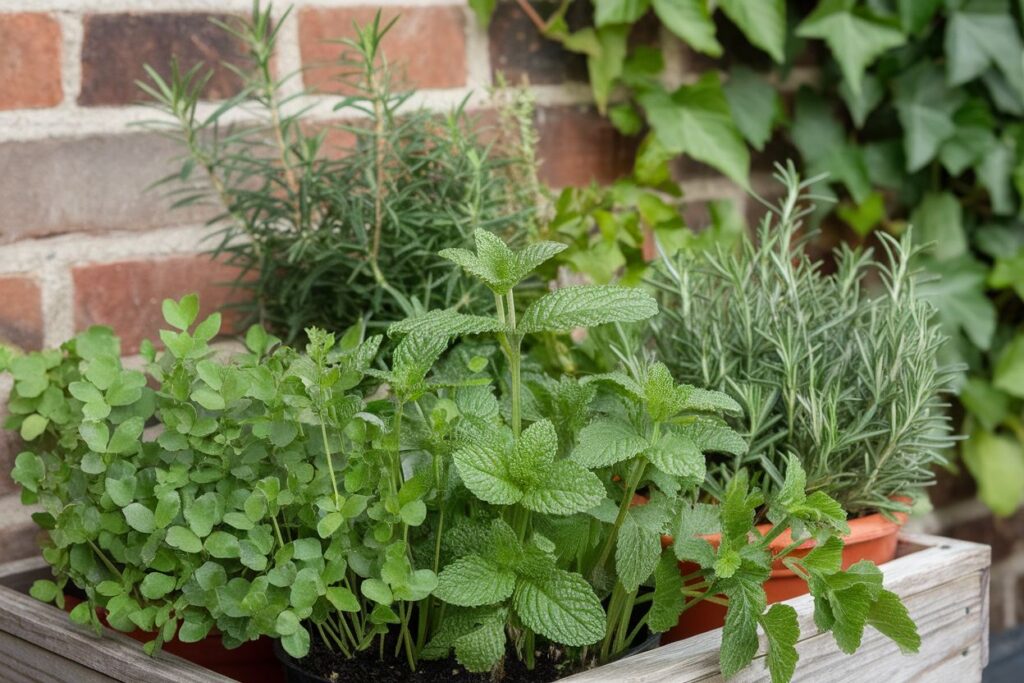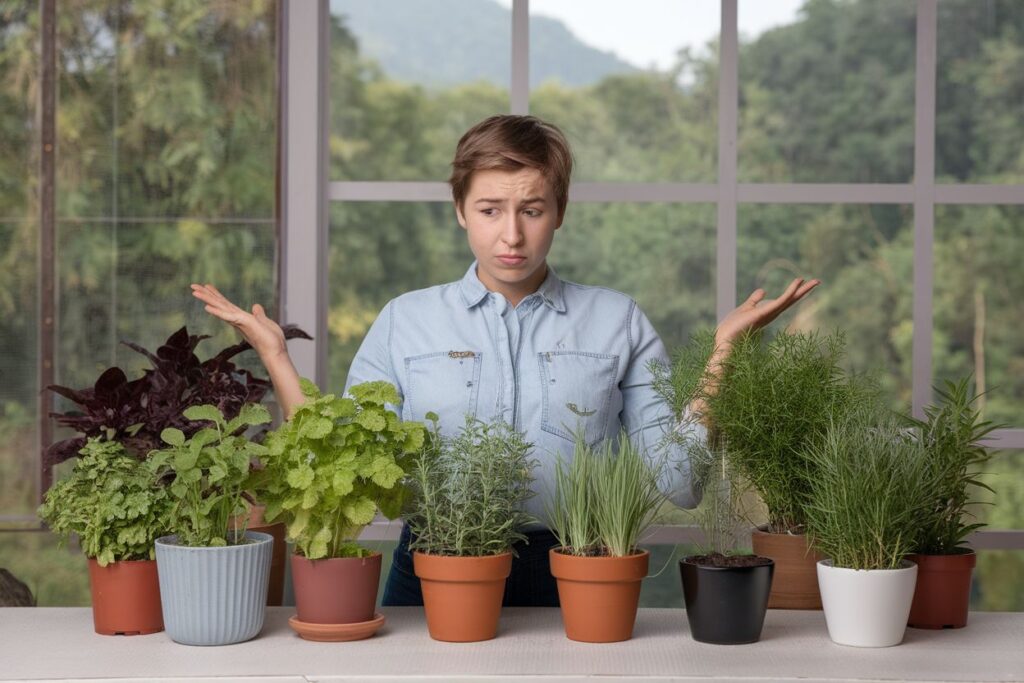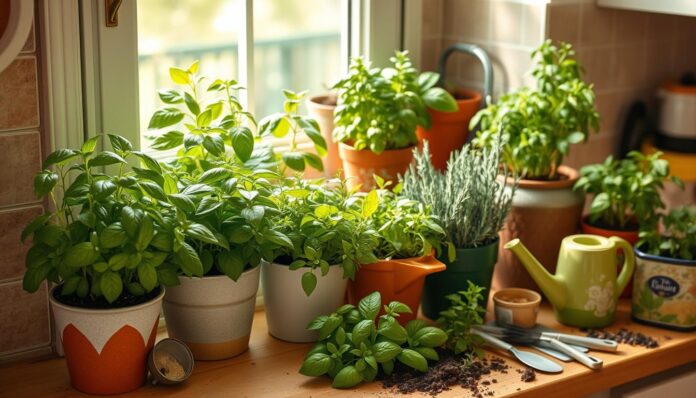Starting a home herb garden can make cooking more exciting. Fresh herbs add amazing flavor and health benefits. They are great for anyone who loves to cook or cares about their health.
Choosing the best herbs depends on your environment, cooking style, and gardening skills. Herbs like basil, mint, and parsley are easy to grow. They are also very versatile in the kitchen.
Some herbs are easy to grow and need little care. They can do well in small spaces or big gardens. Knowing your growing conditions helps pick herbs that will grow well and taste great.
Whether you love cooking or gardening, picking the right herbs is key. The next parts will help you pick, grow, and care for your herbs.
Understanding the Basics of Herb Gardening
Herb gardening lets you explore new flavors and health benefits right at home. It’s perfect for both experienced gardeners and newcomers. Learning the basics can turn your outdoor space into a lush, vibrant garden.
Herbs need a few key things to grow well. They love well-draining soil and lots of sunlight. Most herbs need 6-8 hours of direct sunlight every day.
Some herbs, like mint and parsley, can handle a bit of shade. But herbs from the Mediterranean, like rosemary and thyme, do best in full sun.
You don’t need a lot of tools to start growing herbs. A simple set includes hand trowels, pruning shears, gloves, and pots with holes for water to drain.
Use potting soil made for herbs, organic fertilizers, and a watering can. These are all you need to get started.
“The secret to a great herb garden is understanding each plant’s unique needs and providing the right environment.” – Professional Herbalist
The best time to plant herbs depends on the type and your area’s climate. Spring and early summer are usually the best times.
Basil, cilantro, and dill love the warmth. Chives and parsley do well in cooler weather. Knowing your local growing zone helps pick the best time for each herb.
Best Herb to Grow for Beginners

Starting a herb garden can seem tough, but some herbs are easy for beginners. Basil is a great choice because it grows well in many conditions. It grows fast, which is perfect for those who can’t wait to see results.
Mint is another great herb for beginners. It grows quickly and needs little care. You can grow mint in pots or in the ground, making it very flexible. Even if you’re new to gardening, mint is easy to grow.
“The secret to a successful herb garden is choosing plants that forgive beginner mistakes.” – Professional Gardening Expert
Chives are also a good choice for beginners. They grow fast, can handle different light, and add a nice onion flavor to food. Chives are small, so they’re great for small spaces or indoor gardens.
Rosemary is another herb that’s easy for beginners. It loves sunlight and can go without water often. Its hardiness makes it perfect for those starting their herb garden.
Parsley is the last herb on our list for beginners. Its bright green leaves and many uses in cooking make it a favorite. Parsley grows well indoors and outdoors and adds a fresh touch to any herb garden.
Indoor vs Outdoor Herb Gardens: Making the Right Choice

Deciding between an indoor and outdoor herb garden depends on your space, climate, and goals. Both options let you grow fresh herbs at home, each with its own benefits.
Planning is key for growing herbs. Apartment dwellers and those with little outdoor space can thrive with indoor container herbs. Homeowners with yards have more freedom in their gardening choices.
An indoor herb garden needs the right conditions. Windowsills with bright, indirect light are best for most herbs. Keep temperatures between 60-70°F and ensure good drainage in your containers.
“The key to a successful indoor herb garden is understanding each plant’s unique light and moisture needs.” – Herb Gardening Expert
Outdoor herb gardens grow better in nature. Choose a spot with at least 6 hours of sunlight. Raised beds or special garden areas are great for many herbs, letting them grow strong.
Space is important, whether indoors or outdoors. Use vertical gardening, hanging planters, and compact herbs to save space. Good planning makes your herb garden both productive and beautiful.
Common Mistakes to Avoid When Growing Herbs
Starting an herb garden can be challenging for beginners. Many gardeners face common problems that can stop their garden from growing well. Knowing these issues is key to keeping your herb garden healthy and productive.
One big mistake is overwatering. Herbs need soil that drains well and not too much water. Most herbs prefer soil that lets roots breathe and prevents rot. Check the soil moisture before watering and make sure containers and beds drain well.
“The secret to successful herb care tips is understanding each plant’s unique water requirements.” – Professional Herb Gardener
Lighting is another big challenge. Most herbs need 6-8 hours of direct sunlight each day. Indoor gardeners should place plants near sunny windows or use grow lights. Some herbs, like mint, prefer shade, while others, like basil and rosemary, love the sun.
Not pruning herbs right can make them grow poorly. Regular trimming helps them grow bushy and prevents them from getting too long. Learn how to prune each herb type correctly, cutting just above where leaves meet to help them grow well.
Choosing the right soil and nutrients is crucial. Herbs do best in slightly alkaline, nutrient-rich soil with lots of organic matter. Avoid heavy clay soils that hold too much water and hurt root growth.
Final Thoughts
Growing herbs at home is a great way to change how you cook and garden. You can start small on a windowsill or grow a big herb patch in your backyard. It’s fun for both home cooks and plant lovers.
Having fresh herbs at home does more than just add flavor. It connects you to nature, saves money on groceries, and is a fun hobby. Herbs like basil, mint, rosemary, and thyme are easy to grow and need little care.
To grow a great herb garden, learn the basics, choose the right spot, and avoid common mistakes. Be patient, take good care of your plants, and learn from them. Your garden will be a place of fresh ingredients and green living.
Begin with a few herbs, stay curious, and watch your skills grow. Every herb you pick is a step towards better, greener living. Your journey in cooking and gardening starts today.











